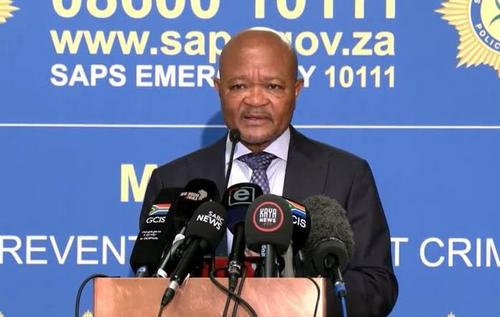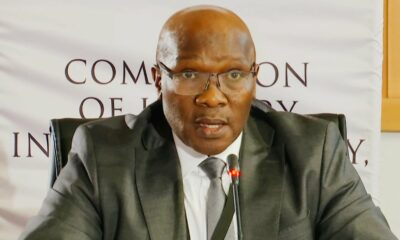News
Mchunu’s SAPS Shake-Up: Can Bold Reform Rebuild Trust in South African Policing?

Splitting divisions, embracing tech, and cracking down on corruption, inside the bold plan to fix what’s broken
South Africans have heard it before: promises of a better, cleaner police force. But this time, Police Minister Senzo Mchunu insists it’s different. Standing before the nation last Friday, he didn’t sugarcoat the crisis. Crime is rampant, communities are fearful, and trust in law enforcement is worn thin. Yet, with a new blueprint in hand, Mchunu says a fundamental SAPS restructure is underway, one that could mark a true “moment of renewal.”
A New Structure for an Old Struggle
The country’s police force is being overhauled, starting with a long-awaited split in the Visible Policing division, which Mchunu says will sharpen front-line performance.
“We now introduce two separate divisions: Visible Policing and Operational Response Services,” he announced.
The split isn’t just bureaucratic housekeeping. It gives clarity of purpose: one division for everyday visibility in communities, and another for specialised ops, border control, and national safety — critical in a country where illegal firearms and cross-border crime fuel syndicates.
Also on the list: a division split between detectives and forensics to untangle inefficiencies and boost case-solving rates, a persistent public sore point.
Fighting Crime with Tech, Intelligence, and Training
Mchunu isn’t just betting on structure. He’s backing intelligence-driven policing supported by modern tech. Five police stations will pilot automation in partnership with Business Against Crime South Africa, aiming to cut paperwork and speed up response times.
“We’re looking at how we can better integrate existing technologies to stay ahead of criminal syndicates,” he said.
The announcement also comes with a recruitment drive. 5,500 new trainees are being enlisted, with an online application system launching for the first time in SAPS history.
General Fannie Masemola, the national commissioner, warned citizens not to fall for scammers demanding bribes to secure placement. “It’s free. No one should pay a cent.”
Two fraudsters were recently arrested for trying exactly that.
Tackling Corruption from Within
Public anger toward SAPS often revolves around internal rot corrupt officers who work hand-in-glove with criminals. Mchunu didn’t shy away from this.
“We dismissed 392 SAPS members last year for corruption,” he said. “There is no tolerance for it.”
He pointed to the conviction of three KZN police officers for accepting bribes, calling it a necessary example of accountability. Still, critics on social media want more than stats, they want convictions at senior levels.
On internal morale, the minister promised a revised promotions system to reward performance and clear the backlog, admitting that SAPS members need more motivation to serve with integrity.
Warning to the Taxi Industry and SAPS Officers Entangled in It
In what’s quickly become a bloody battleground, the taxi industry also came under fire.
“We want to send a warning… this industry cannot be sustained through blood and non-compliance,” Mchunu said sternly.
He also warned police officers to stay out of taxi business disputes, amid allegations that some SAPS members moonlight or tip off rival taxi operators.
Public Reaction: Hopeful, But Cautiously So
On X (formerly Twitter), South Africans responded with a mix of relief and scepticism. Hashtags like #SAPSReform and #MchunuPlan trended briefly on Friday evening. Many applauded the focus on intelligence and technology, but others questioned whether the cultural rot in SAPS could be fixed with structural changes alone.
One user posted:
“We’ve had 3 ministers promise to ‘rebuild SAPS’. Where are those promises now? Show us results, not PowerPoints.”
Another wrote:
“Visible policing works when people trust the police. Start by rooting out the corrupt ones still on the payroll.”
The Bigger Picture: Why This Moment Matters
Mchunu’s reform pitch lands in a South Africa that’s seen violent crime surge, from gender-based violence and armed robberies to political killings. The country has also been burned by state capture, leaving many citizens with little faith in public institutions especially law enforcement.
This isn’t just a bureaucratic shuffle; it’s a test of political will and institutional courage. It’s also the first major public safety plan under the reconfigured Government of National Unity (GNU), and it could set the tone for how coalitions deal with deep-rooted state challenges.
Can It Work?
The plan checks many boxes: better structure, more personnel, smarter tech, and a clear stance on corruption. But reforms are only as strong as their execution. That means properly training new recruits, resisting political interference, and following through on accountability.
South Africa has a long way to go before ordinary citizens feel safe. But for now, at least, there’s movement and perhaps a glimmer of hope that this might be more than just another reshuffle in uniform.
{Source: The Citizen}
Follow Joburg ETC on Facebook, Twitter , TikTok and Instagram
For more News in Johannesburg, visit joburgetc.com



























